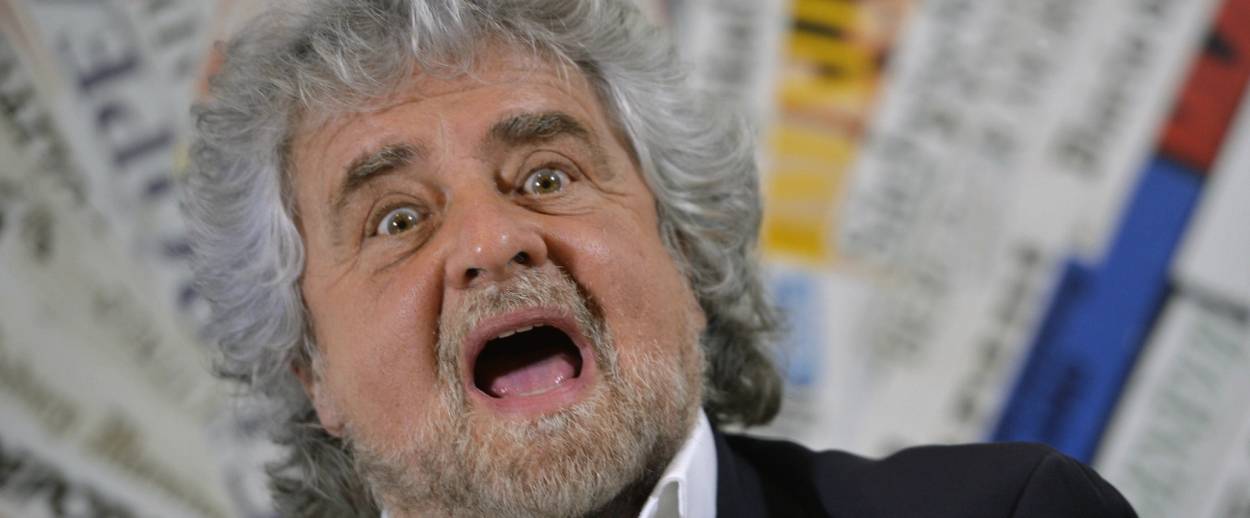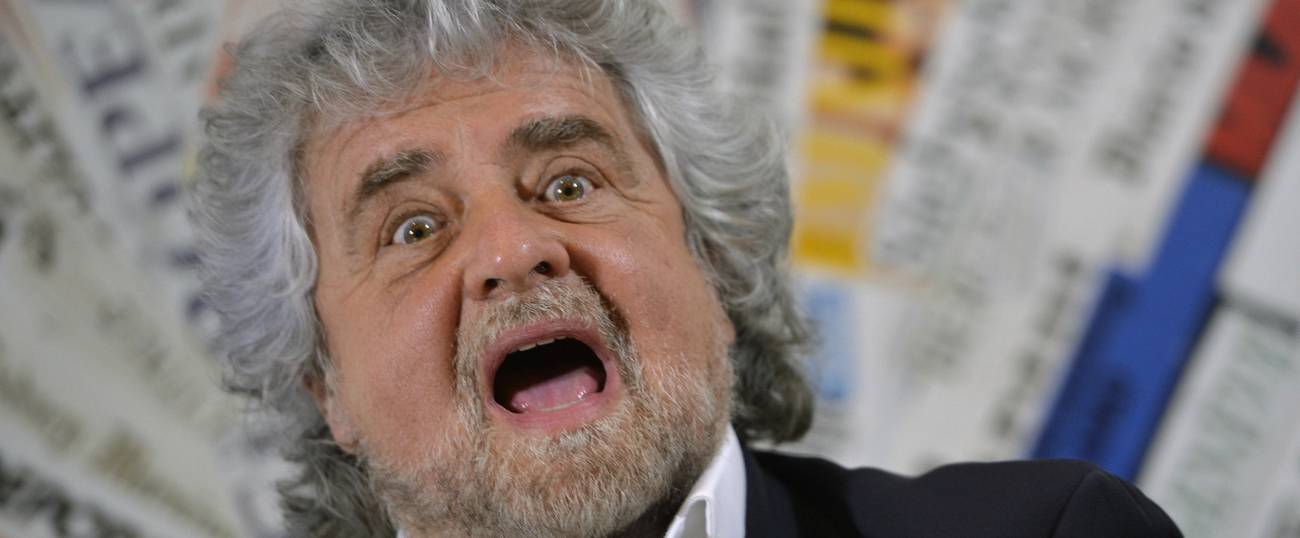With Elections Just Weeks Away, Italy’s Jews Find Little Comfort On the Left and the Right Alike
‘The lesser evil is still evil’




In January, just a few weeks away from the forthcoming parliamentary elections in Italy, a candidate from the Northern League party visited a local radio station for an interview. When asked about the issue of immigration, the candidate said: “We must choose if our ethnicity, the white race, our society, should continue existing or if it should be erased. It’s not a matter of xenophobia or racism,” he continued. “We can’t accept everyone.”
It’s 2018. About 80 years have passed since World War II. You’d think Italian politicians have learned a lesson from their predecessors, but apparently they have not.
Days after the radio interview, an Italian gunman carried out a drive-by shooting, targeting and wounding six African immigrants in the city of Macerata.
Over the last two years, the world has been shaken by some major political changes, from Brexit to the election of Donald J. Trump on the other side of the pond. Populism and xenophobia have gained a major role in the mainstream political landscape around the globe, from the United States to Germany, from France to Poland.
Now, at the beginning of March, it will be Italy’s turn to choose, between a slow, quiet, often dissatisfying status quo versus a loud, capricious alternative often led by inexperienced public figures who feed into the discontent of the masses with unrealistic promises and excessive rhetoric.
Many Italians look at the spectrum of options and feel quite depressed. There is Silvio Berlusconi’s center-right coalition—formed by Forza Italia with the aforementioned Northern League and the Brothers of Italy. There is the disunited center-left coalition, led by former prime minister Matteo Renzi, who resigned in late 2016 after he bitterly lost a constitutional referendum he had advocated for. And then, along with a few other smaller parties, there is the much talked-about Five Star Movement.
If he had to draw comparisons, “the Five Star Movement is the closest entity to Trump’s populism,” said Christian Rocca, a prominent Italian journalist and political analyst, in an interview with Tablet. “It’s hard for the liberal, progressive left to face opponents who make such great promises. Rage and resentment are winning.”
The Five Star Movement has promised to abolish hundreds of laws and to enact a major public expenditure. It’s not clear where the money will come from. What is clear, is that all the Movement’s mayors elected in 2016 have blatantly failed at governing their cities; it would be surprising to see the party succeeding nationally, when it struggles locally. Yet, the latest polls suggest that 26.5 percent of the voting populations supports the party, because it’s the most effective at voicing the country’s discontent.
Not knowing who to choose from in this unenthusiastic race, many Italians are considering to stay home on election day. About 16 million of them, more than 30 percent of the voting population. This is a choice that would be very atypical for the Italian people, who have historically been a people of voters.
If so many people are dubious on who to vote for, or whether to vote or not, the Jews of Italy are even more so.
Italian Jews have historically voted on both sides of the political spectrum. It’s hard to pick sides, said Daniele Regard, a columnist for Huffington Post Italy, now working in the press office of the Lazio region. “On one hand, Italian Jews are aware of the Fascist history of Italy, so they don’t want to support the right-wing. On the other hand, they are attached to Israel. The far left has always sided against Israel.”
As a consequence, many people vote “against” a party, not for one.
Tobia Zevi, a first-time candidate for the Chamber of Deputies with the center-left coalition who happens to be a member of the Jewish community of Rome, thinks that the fact that Italian Jews feel comfortable to vote both to the right and the left is great: “it shows great maturity on behalf of the democracy,” he told Tablet. Over the past year, Zevi has served as counselor to prime minister Gentiloni.
Very few Jews, however, seem to support the Five Star Movement, at least openly. Zevi agreed, explaining that the Five Star vote is an expression of anger in relation to the economic crisis that has hit Italy over the last decade: “I’m sure also the Jews share the same problems and worries as the rest of the population; but they probably prefer more stable, reliable options.”
“The polls indicate that the majority of the Italian youth will abstain from voting. I wonder if this is also the case for the Jewish youth,” said Carlotta Jarach, the 24-year-old president of the Jewish Italian Youth organization, known as UGEI.
Jarach said that her organization, as well as the Jewish community in general, are worried about certain parties and candidates. She mentioned the mayor of a small town near Milan, from the Northern League party. On January 27, this mayor posted on Facebook: “Since today is the [Holocaust] Memorial Day, remember to go fuck yourselves.”
“The Five Star Movement is the party I’m most worried about,” said Jarach. “Some of their leaders have expressed in the past support for the BDS movement; I believe this is not driven by political criticism [towards Israel]—rather, it’s badly disguised anti-semitism. It’s a populist party, their rhetoric is filled with conspiracy theories.”
There have been episodes of anti-semitism in recent months across Italy.
Last December, at a pro-Palestinian rally in Milan, protesters chanted in Arabic: “Khaybar, Khaybar, Oh Jews, the army of Muhammad will return.” The Jewish community protested with the municipal administration.
In January, a group of students organized an event at the University of Turin, “Israel and the exploitation of the Holocaust,” and held it on campus. “They distributed a pamphlet which stated that the Shoah was organized by the Zionists, who used it as a political move to create the State of Israel,” said Jarach. Several Jewish organization contacted the rector of the university, but the event took place anyway.
The coalition that worries most Jews in relation to these episodes of anti-semitism, however, is the right-wing. “Historically, the [Northern] Leagues is a xenophobic movement. The other party, Brothers of Italy—you could call it ‘neo-Fascist,’ or ‘post-Fascist,’” said Rocca.
At the beginning of the race, the leader of the Northern League, said that if he were elected he would abolish the Mancino Law, a law that prohibits Fascist and racist propaganda, as well as hate crimes.
As alarming as these episodes are, the true challenge for the journalists covering the race is the surge of fake news related to the campaign. Even Pope Francis warned against it. A poll suggested that one out of three people believe in fake news they read online; among the latest, and most shared, bits of viral disinformation is a report on a non-existing sister of Laura Boldrini, the president of the Chamber of Deputies, who would “manage hundreds of cooperatives assisting immigrants.”
“So many people share [fake news on Facebook]. They just read the headline, they don’t even read the article,” said Regard, from the press office of the Lazio region. “It’s one of the limits of social media, we must fight against it.”
On March 4, Italians will elect their new government. As the U.S. election has demonstrated, polls are no longer a reliable source to predict the winners; in fact, too many people are still in the process of choosing their favorite candidates or won’t openly express their preference.
Carlotta Jarach said that she will decide which party to go for only after “excluding the worst and saying who’s left.” And that’s a strategy that many voters are going for. “I will exclude the Fascists… the populists…” she began listing, “Whoever doesn’t recognize Hamas as a terrorist group… whoever discriminates on minorities…”
At the end of this draining exclusion process, she will choose, she said, the “lesser evil.” After a moment of silence, she added: “But, as Hannah Arendt wrote, the lesser evil is still evil.”
Simone Somekh is a New York-based author and journalist. He’s lived and worked in Italy, Israel, and the United States.